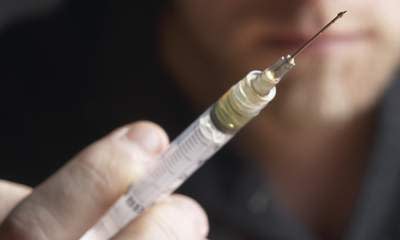WHO Sorry Over Greece HIV Injection Claims
The World Health Organisation (WHO) has been forced to backtrack after wrongly claiming Greeks were intentionally infecting themselves with HIV to claim benefits.
WHO said HIV rates had risen "significantly" in the debt-ridden country, with "about half" of new HIV infections self-inflicted, allowing people to receive benefits of €700 (£585) per month.
The report, prepared by University College London's Institute of Health Equity, said: "HIV rates and heroin use have risen significantly, with about half of new HIV infections being self-inflicted to enable people to receive benefits of €700 per month and faster admission on to drug substitution programmes."
The findings were reported by news organisations around the world, but after the claims came under further scrutiny, WHO was forced into a humiliating climbdown.
The organisation's head of public affairs Gregory Haertl said on Twitter that there had been a "typo" in the report, adding: "People r not giving themselves HIV in Greece to get benefits."
In an official statement, the WHO said the sentence should have read: "half of the new HIV cases are self-injecting and out of them few are deliberately inflicting the virus."
The organisation apologised for the error, which it blamed on "an error in the editing of the document".
It said the sources of the statement were 2011 reports from the Lancet and the Greek Documentation and Monitoring Centre for Drugs, which mentioned "accounts of deliberate self-infliction by a few individuals".
The WHO said: "Greece has reported a significant, 52% increase of new HIV infection in 2011 compared to the 2010, largely driven by infections among people who inject drugs in recent years.
"The reasons for this increase remain multifaceted and WHO welcomes efforts of the ad hoc working group and other entities to fully understand the underlying reasons and recommend appropriate measures to extend the benefits of the comprehensive package of interventions for harm reduction to all people who inject drugs."
Figures from the Hellenic Centre for Disease Control and Prevention , also known as Keelpno, showed the HIV infection rate in Greece has nearly tripled in 10 years - up from 3.9 in every 100,000 people in 2003 to 10.9 in 2012.
There were 1,180 HIV infections last year compared with 434 in 2003, while the disease was transmitted through injections in around a tenth (8.9%) of cases in 2012.
The majority of infections (53%) occur among Greek men aged 25-39.
Prostitution also increased, "probably as a response to economic hardship", it said, adding that Greeks were less likely than they were in 2007 to visit a doctor or dentist when they were feeling unwell.
Greece is going through its sixth consecutive year of recession amid brutal austerity cuts.
The country has twice been bailed out by the international community, although its draft budget for 2014 predicts economic growth of 0.6% next year.

 Yahoo News
Yahoo News 

